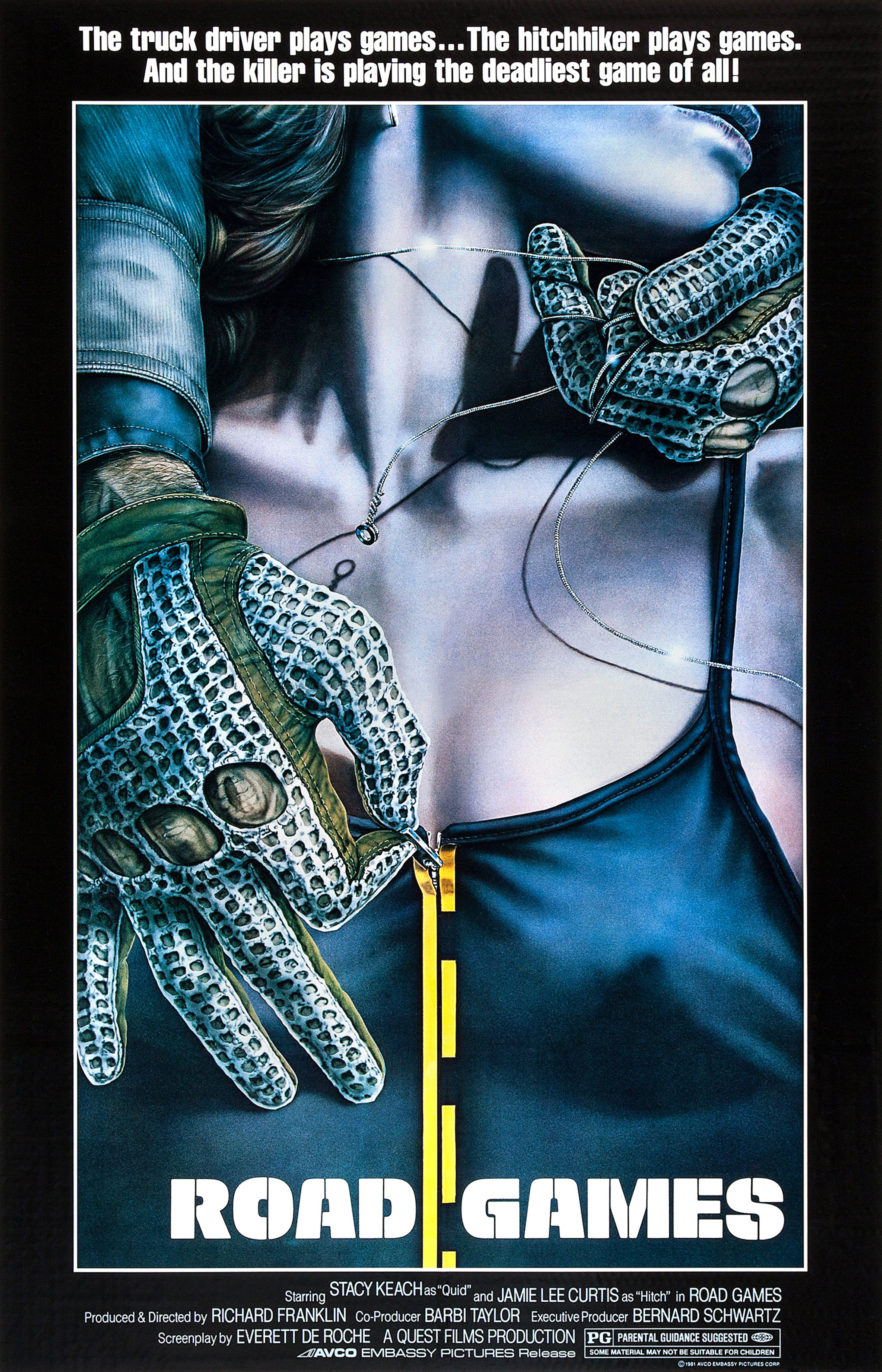A truck driver plays games. A hitchhiker plays games. And the killer plays the deadliest game of all!
Road Games, not surprising given the title, is . . . yep, a road picture. Maybe not the kind in Two for the Road (1967), a comedy-romance where Audrey Hepburn and Albert Finney attempt to re-energize a failing marriage during a road trip. More like, perhaps, Dennis Weaver’s flight from a demonic tractor-trailer with a mind of its own in the TV movie Duel (1971). Games’ centerpiece is such a truck, albeit with a driver.
Better still, combine a touch of all these ingredients—and add a dash of Alfred Hitchcock.
Road Games is not as good as the average Hitchcock film, even though it was directed by the so-called “Australian Hitchcock,” Richard Franklin. The Hitch connection goes back to Franklin’s days at USC when he invited the famous British director to a Q&A screening of Rope (1948), and Hitch, in return, invited him to the set of Topaz (1969). Franklin tried, largely unsuccessfully, to scare the bejeebers out of movie-goers with Psycho II(1983).
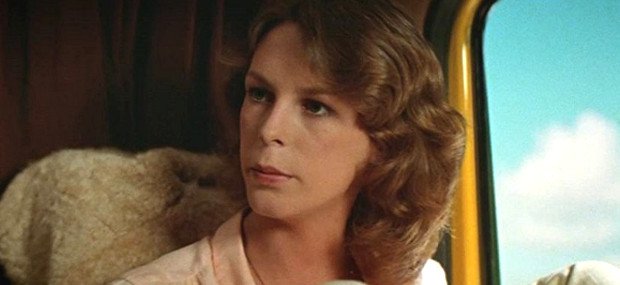 Road Games is much more subtle, and is a better film. Released a year after Hitch’s death, it’s something of an homage to the late director—Jamie Lee Curtis’ character is named “Hitch” and she glances through a magazine about Hitchcock movies. Plot and filming have something of the Hitch touch, including a recurring esky (Australian term for a portable cooler), similar to the Hitchcock MacGuffin, and a long shot with the subject of interest, mysterious and unresolved, in the distance (Cary Grant wondering from afar what Ingrid Bergman and Claude Rains are discussing in a horseback ride during Notorious, 1946).
Road Games is much more subtle, and is a better film. Released a year after Hitch’s death, it’s something of an homage to the late director—Jamie Lee Curtis’ character is named “Hitch” and she glances through a magazine about Hitchcock movies. Plot and filming have something of the Hitch touch, including a recurring esky (Australian term for a portable cooler), similar to the Hitchcock MacGuffin, and a long shot with the subject of interest, mysterious and unresolved, in the distance (Cary Grant wondering from afar what Ingrid Bergman and Claude Rains are discussing in a horseback ride during Notorious, 1946).
 The obvious Hitch film of inspiration is Rear Window (1954), James Stewart and Grace Kelly on the trail of a murderer (Raymond Burr), as are Curtis and Keach.
The obvious Hitch film of inspiration is Rear Window (1954), James Stewart and Grace Kelly on the trail of a murderer (Raymond Burr), as are Curtis and Keach.
Of course, much of the time Franklin doesn’t trust enough his apparent commitment to his idol to avoid the lurid slasher and shock-out-of-the-dark tricks of the Halloween (1978) and Nightmare on Elm Street (1984) types. When, for example, Keach thinks he’s found the killer in a bathroom stall, with only a pair of shoes visible, the intended tension is stretched for so long that any real suspense or shock is dissipated.
Toward the end, Keach creeps through his freezer trailer, fearful of finding Curtis’ body hanging among the sides of pig carcasses he’s been hauling throughout the movie—again, the scene runs on and on.
The Australian film begins as truck driver Pat Quid (Keach) pulls into a motel for the night. He notices the female hitchhiker he had earlier passed by—the trucking company forbids taking on passengers—get out of a green van and enter the motel with its driver.
Later, in another room down from Quid’s, a naked girl, strumming a guitar on the bed, is strangled (Hitchcock’s favorite murder method) by a man using a guitar string.
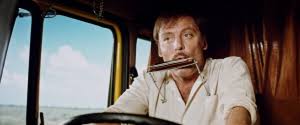 While preparing to hit the road to Perth the next morning, Quid notices his pet dingo Boswell (played by Killer, the name the antithesis of his languid performance) sniffing around a garbage bag and, above in a window, someone watching through a crack in the curtains.
While preparing to hit the road to Perth the next morning, Quid notices his pet dingo Boswell (played by Killer, the name the antithesis of his languid performance) sniffing around a garbage bag and, above in a window, someone watching through a crack in the curtains.
While on the road, Quid encounters the strange and the bizarre—a man leisurely hauling a sailboat, a woman henpecking her husband, a station wagon full of toy balls and another female hitchhiker whom he passes several times.
When that henpecking wife (Marion Edward), put out by her husband, creates a roadblock and compels Quid to stop, she jumps in the cab and insists he catch up with the car. Her presence serves to convey the news of a serial killer on the loose, reinforcing Quid’s mounting suspicions. When she suspects Quid might be the killer, she expeditiously exits the film.
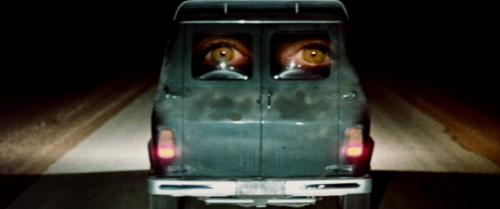 Quid later spots the green van, some distance away across the outback. Its driver seems to be burying some plastic bags. When he sees Quid watching him through binoculars, he speeds off in the van. (One might wonder why Quid doesn’t investigate the digging site.)
Quid later spots the green van, some distance away across the outback. Its driver seems to be burying some plastic bags. When he sees Quid watching him through binoculars, he speeds off in the van. (One might wonder why Quid doesn’t investigate the digging site.)
At a roadhouse, Quid attempts to telephone the authorities but can’t be heard above the loud band which refuses to stop playing. Belligerent faces and postures warn that any further intervention could be dangerous, so he returns to the road.
Once again he spots the green van some distance down the highway, but the man hauling the sailboat is in his way and refuses to let him pass. Eventually Quid’s big tractor-trailer pushes the man off the road, smashing the sailboat. By now the van is out of sight and beyond overtaking.
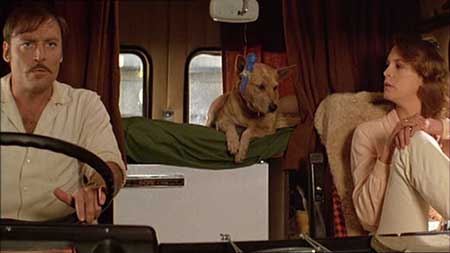 Next, he picks up the hitchhiker he had passed before. In their conversations, Pamela (Curtis) reveals that she is on the run from her powerful father (overtones of Claudette Colbert in It Happened One Night, 1934).
Next, he picks up the hitchhiker he had passed before. In their conversations, Pamela (Curtis) reveals that she is on the run from her powerful father (overtones of Claudette Colbert in It Happened One Night, 1934).
At a service station, Quid and Pamela see the green van. While he checks out the bathroom for the driver, she approaches the van, but after his encounter with the man proves a red herring, he discovers the van—and Pamela—are gone.
Later, after finding his trailer door ajar and checking among the hanging carcasses, afraid of finding the missing Pamela, he arrives at a weigh station in Perth. There he sees the ubiquitous green van and follows it through the city streets. When the van reaches a dead end and the tractor-trailer becomes stuck in the narrow street, the van driver (Grant Page) attempts to strangle Quid but Quid overpowers him.
The police, who had been following the two vehicles, assume that Quid is guilty until a gagged and bound Pamela is freed from the van. The real killer is apprehended trying to flee into the crowd.
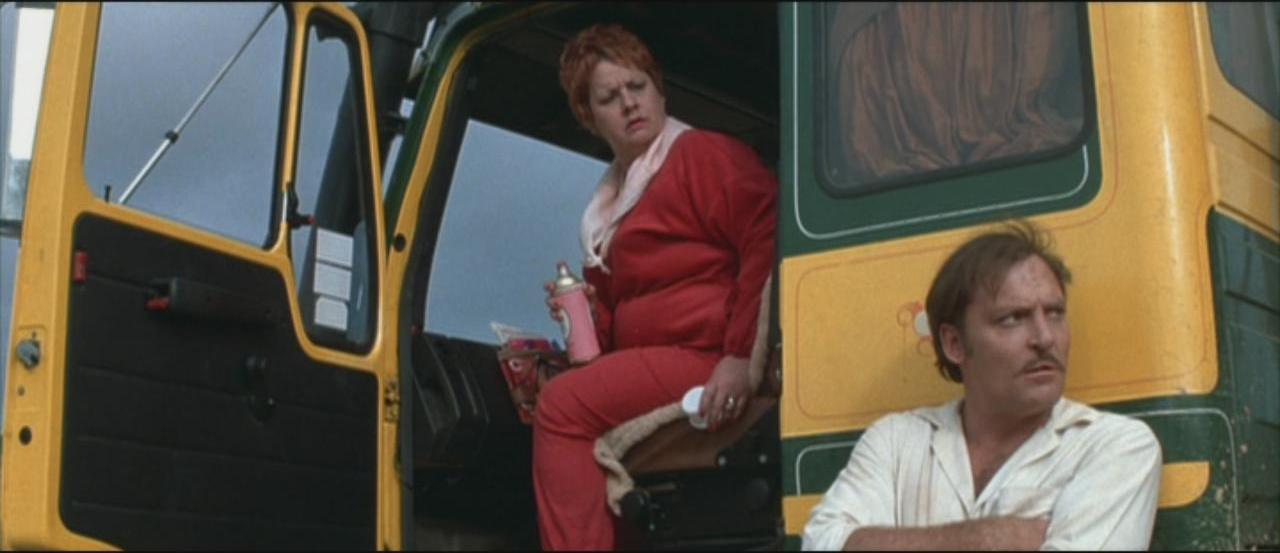 Keach and Curtis have a certain chemistry, and the age difference—seventeen years or so—isn’t too great to make a convincing romance. Keach remarks soon after their characters have met that he’s old enough to be her father, but by film’s end that doesn’t seem to matter to either one of them.
Keach and Curtis have a certain chemistry, and the age difference—seventeen years or so—isn’t too great to make a convincing romance. Keach remarks soon after their characters have met that he’s old enough to be her father, but by film’s end that doesn’t seem to matter to either one of them.
Road Games has a curious mixture of sardonic humor and ghoulish bad taste, a strutting self-image from director Franklin that falls to measure up, leaving the gnawing sense that things could have been better in a number of areas.
After Keach and Curtis have walked into the sunset with romantic implications—that much can be revealed—a chilling last shot—withheld here—added by the producer but disliked by Franklin as unsavory, resorts again to the Halloween-type shocker. This last splash of gore negates much that has gone before and further mars what could have been an outstanding effort rather than just an interesting one.
[embedyt] https://www.youtube.com/watch?v=txVhlNWj8QU[/embedyt]
